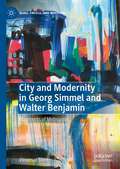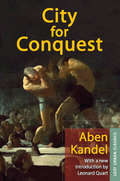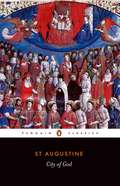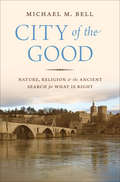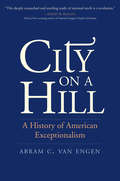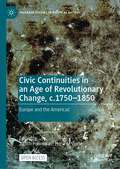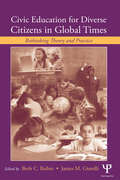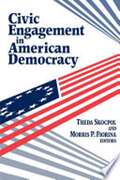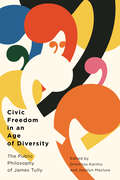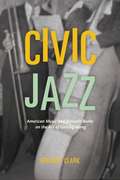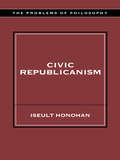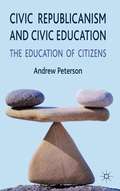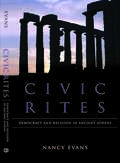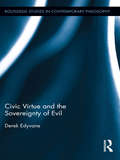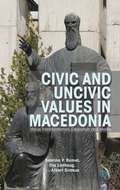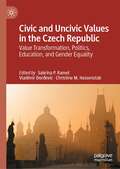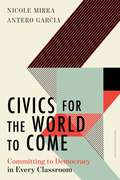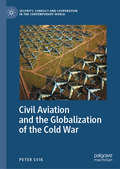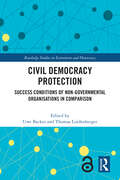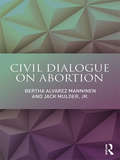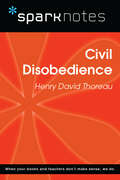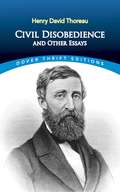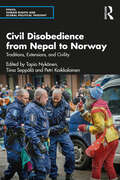- Table View
- List View
City and Modernity in Georg Simmel and Walter Benjamin: Fragments of Metropolis (Marx, Engels, and Marxisms)
by Vincenzo MeleThis book reconstructs and compares the social theories of modernity of Georg Simmel and Walter Benjamin, two classic thinkers in German social thought. The author focuses on five main topics: the historical-sociological method through which they investigate modernity; how are the concepts of history and society possible; the consequences of modern metropolis on the construction of individual subjectivity; the aestheticization of everyday life caused by the expansion of commodity culture; and the female culture as a counter-power to the domination of masculine objective culture. In the decades since Simmel and Benjamin, urban reality has undergone profound changes and we may even question the very existence of the subject of analysis: what is the city, the metropolis in today’s context of globalization and capital flows? Simmel’s and Benjamin’s metropolis has thus become an “endless city," beyond the physical and geographical confines of urban reality.
City for Conquest (Lost Urban Classics Ser.)
by Aben KandelF. Scott Fitzgerald's The Great Gatsby still captivates readers with its vision of 1920s New York as a city of infinite potential, where ambition and defeat live hand in hand. This sentiment is captured, with even greater acuity, in the pages of Aben Kandel's nearly forgotten masterpiece of urban life, City for Conquest (1936). The source of the classic 1940s James Cagney film of the same name, this panoramic New York novel captures the complex patterns of city life, vividly evoking a metropolis of dreams and nightmares.Kandel portrays a volatile city inhabited by the aristocrat, the criminal, the idealist, the bohemian, the driven, the entrapped, and the impoverished, all equally striving "to make a dent in this town." The city itself is booming, its new constructions callously built on destruction, supplanting with equal disdain the slums of Brooklyn and the farm fields of the Bronx. This feverish microcosm of humanity inhabits a world of immense inequality where "six blocks from Wall Street, people haven't got a dime, six blocks from duplex apartments, people live in hovels" and "between the scarlet sore and the apple of the eye there lay a thick eyebrow of indifference."A literary triumph in the tradition of Stephen Crane's Maggie: A Girl of the Streets and John Dos Passos' Manhattan Transfer, and out of print for far too long, City for Conquest is the inaugural work of fiction in Transaction's new Lost Urban Classics series.
City of God
by Saint AugustineCity of God is an enduringly significant work in the history of Christian thought, by one of its central figuresWritten as an eloquent defence of the faith at a time when the Roman Empire was on the brink of collapse, this great theological and philosophical work by St Augustine, bishop of Hippo, examines the ancient pagan religions of Rome, the arguments of the Greek philosophers and the revelations of the Bible. Pointing the way forward to a citizenship that transcends worldly politics and will last for eternity, City of God is one of the most influential documents in the development of Christianity.Translated with Notes by Henry Bettenson with an Introduction by G. R. Evans
City of the Beast: The London of Aleister Crowley
by Phil BakerA work that combines biography and pyschogeography to trace Aleister Crowley's life in London."I dreamed I was paying a visit to London," Aleister Crowley wrote in Italy, continuing, "It was a vivid, long, coherent, detailed affair of several days, with so much incident that it would make a good-sized volume." Crowley had a love-hate relationship with London, but the city was where he spent much of his adult life, and it was the capital of the culture that created him: Crowley was a post-decadent with deviant Victorian roots in the cultural ferment of the 1890s and the magical revival of the Golden Dawn. Not a walking guide, although many routes could be pieced together from its pages, this is a biography by sites. A fusion of life-writing with psychogeography, steeped in London's social history from Victoria to the Blitz, it draws extensively on unpublished material and offers an exceptionally intimate picture of the Great Beast. We follow Crowley as he searches for prostitutes in Hyde Park and Pimlico, drinks absinthe and eats Chinese food in Soho, and find himself down on his luck in Paddington Green--and never quite losing sight of the illumination that drove him: "the abiding rapture," he wrote in his diary, "which makes a 'bus in the street sound like an angel choir!"
City of the Good: Nature, Religion, and the Ancient Search for What Is Right
by Michael Mayerfield BellHow we came to seek absolute good in religion and nature—and why that quest often leads us astrayPeople have long looked to nature and the divine as paths to the good. In this panoramic meditation on the harmonious life, Michael Mayerfeld Bell traces how these two paths came to be seen as separate from human ways, and how many of today’s conflicts can be traced back thousands of years to this ancient divide.Taking readers on a spellbinding journey through history and across the globe, Bell begins with the pagan view, which sees nature and the divine as entangled with the human—and not necessarily good. But the emergence of urban societies gave rise to new moral concerns about the political character of human life. Wealth and inequality grew, and urban people sought to justify their passions. In the face of such concerns, nature and the divine came to be partitioned from the human, and therefore seen to be good—but they also became absolute and divisive.Bell charts the unfolding of this new moral imagination in the rise of Buddhism, Christianity, Daoism, Hinduism, Jainism, and many other traditions that emerged with bourgeois life. He follows developments in moral thought, from the religions of the ancient Sumerians, Greeks, and Hebrews to the science and environmentalism of today, along the way visiting with contemporary indigenous people in South Africa, Costa Rica, and the United States. City of the Good urges us to embrace the plurality of our traditions—from the pagan to the bourgeois—and to guard against absolutism and remain open to difference and its endless creativity.
City on a Hill: A History of American Exceptionalism
by Abram C. Van EngenA fresh, original history of America&’s national narratives, told through the loss, recovery, and rise of one influential Puritan sermon from 1630 to the present day In this illuminating book, Abram Van Engen shows how the phrase &“City on a Hill,&” from a 1630 sermon by Massachusetts Bay governor John Winthrop, shaped the story of American exceptionalism in the twentieth century. By tracing the history of Winthrop&’s speech, its changing status throughout time, and its use in modern politics, Van Engen asks us to reevaluate our national narratives. He tells the story of curators, librarians, collectors, archivists, antiquarians, and often anonymous figures who emphasized the role of the Pilgrims and Puritans in American history, paving the way for the saving and sanctifying of a single sermon. This sermon&’s rags-to-riches rise reveals the way national stories take shape and shows us how those tales continue to influence competing visions of the country—the many different meanings of America that emerge from its literary past.
Civic Continuities in an Age of Revolutionary Change, c.1750–1850: Europe and the Americas (Palgrave Studies in Political History)
by Henk Te Velde Judith PollmannThis open access book explores the role of continuity in political processes and practices during the Age of Revolutions. It argues that the changes that took place in the years around 1800 were enabled by different types of continuities across Europe and in the Americas. With historians of modernity tending to emphasise the rise of the new, scholarship has leaned towards an assumption that existing modes of action, thought and practice simply became extinct, irrelevant or at least subordinate to new modes. In contrast, this collection examines continuities between early modern and modern political cultures and organization in Europe and the Americas. Shifting the focus from political modernization, the authors examine the continued relevance of older, often local, practices in (post)revolutionary politics. By doing so, they aim to highlight the role of local political traditions and practices in forging and enabling political change. The book argues that while political change was in fact at the centre of both the old and new polities that emerged in the Age of Revolutions, it coexisted with, and was indeed enabled by, continuities at other levels.
Civic Education for Diverse Citizens in Global Times: Rethinking Theory and Practice (Rutgers Invitational Symposium On Education Ser.)
by Beth C. Rubin James M. GiarelliThis book explores four interrelated themes: rethinking civic education in light of the diversity of U.S. society; re-examining these notions in an increasingly interconnected global context; re-considering the ways that civic education is researched and practiced; and taking stock of where we are currently through use of an historical understanding of civic education. There is a gap between theory and practice in social studies education: while social studies researchers call for teachers to nurture skills of analysis, decision-making, and participatory citizenship, students in social studies classrooms are often found participating in passive tasks (e.g., quiz and test-taking, worksheet completion, listening to lectures) rather than engaging critically with the curriculum. Civic Education for Diverse Citizens in Global Times, directed at students, researchers and practitioners of social studies education, seeks to engage this divide by offering a collection of work that puts practice at the center of research and theory.
Civic Engagement in American Democracy
by Theda Skocpol Morris P. FiorinaAmerican democracy is in many ways more vital than ever before. Advocacy groups proliferate and formerly marginalized groups enjoy new opportunities. But worrisome trends exist. Millions of Americans are drawing back from involvements with community affairs and politics. Voters stay home; public officials grapple with distrust or indifference; and people are less likely to cooperate on behalf of shared goals. Observers across the spectrum of opinion agree that it is vital to determine what is happening and why --so that Americans can take well-informed, effective steps to revitalize our national community. <p><p> The book opens with an eagle-eye look at the roots of America's special patterns of civic engagement, examining the ways social groups and government and electoral politics have influenced each other. Other chapters examine the impact of advocacy groups and socioeconomic inequalities on democratic processes and probe the influence of long-term social and cultural changes on voluntary associations and civic participation. The book concludes by asking why social liberation has been accompanied by new inequalities and the erosion of many important forms of citizen leverage and participation. <p><p> Coming together from several disciplines, contributors include Jeffrey M. Berry, Henry E. Brady, John Brehm, Steven Brint, Elisabeth S. Clemens, Peter Dobkin Hall, Wendy M. Rahn, Kay Lehman Schlozman, Sidney Verba, and Robert Wuthnow.Copublished with the Russell Sage Foundation
Civic Engagement in Postwar Japan
by Rieko KageDespite reduced incomes, diminished opportunities for education, and the psychological trauma of defeat, Japan experienced a rapid rise in civic engagement in the immediate aftermath of World War II. Why? Civic Engagement in Postwar Japan answers this question with a new general theory of the growth in civic engagement in postwar democracies. It argues that wartime mobilization unintentionally instills civic skills in the citizenry, thus laying the groundwork for a postwar civic engagement boom. Meanwhile, legacies of prewar associational activities shape the costs of association-building and information-gathering, thus affecting the actual extent of the postwar boom. Combining original data collection, rigorous statistical methods, and in-depth historical case analyses, this book illuminates one of the keys to making postwar democracies work.
Civic Freedom in an Age of Diversity: The Public Philosophy of James Tully (Democracy, Diversity, and Citizen Engagement Series)
by Dimitrios Karmis and Jocelyn MaclureJames Tully is one of the world’s most influential political philosophers at work today. Over the past thirty years – first with Strange Multiplicity (1995), and more fully with Public Philosophy in a New Key (2008) and On Global Citizenship (2014) – Tully has developed a distinctive approach to the study of political philosophy, democracy, and active citizenship for a deeply diverse world and a de-imperializing age. Civic Freedom in an Age of Diversity explores, elucidates, and questions Tully’s innovative approach, methods, and concepts, providing both a critical assessment of Tully’s public philosophy and an exemplification of the dialogues of reciprocal elucidation that are central to Tully’s approach. Since the role of public philosophy is to address public affairs, the contributors consider public philosophy in the context of pressing issues and recent civic struggles such as: crises of democracy and citizenship in the Western world; global citizenship; civil disobedience and non-violence; Indigenous self-determination; nationalism and federalism in multinational states; protest movements in Turkey and Quebec; supranational belonging in the European Union; struggles over equity in academia; and environmental decontamination, decolonization, and cultural restoration in Akwesasne.Offering a wide-ranging analytical discussion of Tully’s work by leading scholars from various fields of study, with an extensive reply by Tully himself, Civic Freedom in an Age of Diversity provides a rich perspective on the full extent of his contribution.
Civic Jazz: American Music and Kenneth Burke on the Art of Getting Along
by Gregory ClarkJazz is born of collaboration, improvisation, and listening. In much the same way, the American democratic experience is rooted in the interaction of individuals. It is these two seemingly disparate, but ultimately thoroughly American, conceits that Gregory Clark examines in Civic Jazz. Melding Kenneth Burke’s concept of rhetorical communication and jazz music’s aesthetic encounters with a rigorous sort of democracy, this book weaves an innovative argument about how individuals can preserve and improve civic life in a democratic culture. Jazz music, Clark argues, demonstrates how this aesthetic rhetoric of identification can bind people together through their shared experience in a common project. While such shared experience does not demand agreement--indeed, it often has an air of competition--it does align people in practical effort and purpose. Similarly, Clark shows, Burke considered Americans inhabitants of a persistently rhetorical situation, in which each must choose constantly to identify with some and separate from others. Thought-provoking and path-breaking, Clark’s harmonic mashup of music and rhetoric will appeal to scholars across disciplines as diverse as political science, performance studies, musicology, and literary criticism.
Civic Republicanism (Problems of Philosophy)
by Iseult HonohanCivic Republicanism is a valuable critical introduction to one of the most important topics in political philosophy. In this book, Iseult Honohan presents an authoritative and accessible account of civic republicanism, its origins and its problems. The book examines all the central themes of this political theory. In the first part of the book, Honohan explores the notion of historical tradition, which is a defining aspect of civic republicanism, its value and whether a continued tradition is sustainable. She also discusses the central concepts of republicanism, how they have evolved, in what circumstances civic republicanism can be applied and its patterns of re-emergence. In the second part of the book, contemporary interpretation of republican political theory is explored and question of civic virtue and participation are raised. What is the nature of the common good? What does it mean to put public before private interests and what does freedom mean in a republican state? Honohan explores these as well as other questions about the sustainability of republican thought in the kind of diverse societies we live in today. Civic Republicanism will be essential reading for students of politics and philosophy.
Civic Republicanism and Civic Education
by Andrew PetersonThis book critically explores civic republicanism in light of contemporary republican political theory and the influence of republican models of citizenship in recent developments in civic education across a number of Western nations.
Civic Rites: Democracy and Religion in Ancient Athens
by Nancy EvansCivic Rites explores the religious origins of Western democracy by examining the government of fifth-century BCE Athens in the larger context of ancient Greece and the eastern Mediterranean. Deftly combining history, politics, and religion to weave together stories of democracy’s first leaders and critics, Nancy Evans gives readers a contemporary’s perspective on Athenian society. She vividly depicts the physical environment and the ancestral rituals that nourished the people of the earliest democratic state, demonstrating how religious concerns were embedded in Athenian governmental processes. The book’s lucid portrayals of the best-known Athenian festivals—honoring Athena, Demeter, and Dionysus—offer a balanced view of Athenian ritual and illustrate the range of such customs in fifth-century Athens.
Civic Virtue and the Sovereignty of Evil: Civic Virtue And The Sovereignty Of Evil (Routledge Studies in Contemporary Philosophy)
by Derek EdyvaneThe last decade has witnessed a growing perception of ethical crisis in public life. Circumstances of political uncertainty, fueled by the rise of international terror and global financial crisis, have placed the practice of civic virtue under severe strain. Our turbulent times have prompted many people to think less about the "good life" and the "good society" and more about their basic needs for safety and reassurance. Consequently, while prominent public commentators call for the reassertion of civic virtue in the public square, it is very hard to see what basis there can be for its practice in present conditions. This book articulates a new perspective on public morality in uncertain times by defending a radical re-orientation of civic ethics away from the pursuit of the good society and toward the prevention of the great evils of human life. Edyvane makes the following central innovations: Uses the resources of philosophy to help us think about vital social, political, and spiritual questions that have dominated the public conversation of liberal democracies since 9/11; Offers a new perspective on key scholarly debates about civic virtue in a way that provokes disquieting questions about the character of religious diversity and conflict and the nature of foundations of public morality; Develops and deploys a novel intellectual approach by drawing on the insights of art and literature to inform and enrich philosophical enquiry.
Civic and Uncivic Values in Macedonia
by Sabrina P. Ramet Ola Listhaug Albert SimkusOne of the central challenges facing Macedonia, along with other Yugoslav successor states, is to develop civic values and to combat such uncivic values as ethnic intolerance, religious bigotry, and homophobia. This volume brings together specialists in Macedonian affairs to offer insights into the experiences and values of the Macedonians.
Civic and Uncivic Values in the Czech Republic: Value Transformation, Politics, Education, and Gender Equality
by Sabrina P. Ramet Christine M. Hassenstab Vladimir ÐorđevićThis book considers the state of Czech democracy, following the rise of authoritarian regimes in Poland and Hungary and the ascent of billionaire oligarch Andrej Babiš to the office of prime minister of the Czech Republic, leading to concerns about conflict of interest. The authors argue that civic values, such as tolerance, respect for the equality of people, and readiness to play by the rules of the political game, are key factors in determining whether the Czech Republic will maintain its democracy in the coming years. The book employs a broad perspective, bringing together insights from political science, sociology, cultural studies, and other disciplines to analyse changes in the democracy of the Czech Republic since 1989, taking into consideration various dimensions of civic values, including politics, gender inequality, film, and the media.
Civics for the World to Come: Committing to Democracy in Every Classroom (Equity and Social Justice in Education #0)
by Antero Garcia Nicole MirraHelp students use their voices to build an equitable and just society. Years of political violence and protests against injustice have revived interest in teaching civics in schools. The problem? Civic education—as it currently exists—privileges systems, not students. It promotes incremental change within a broken democracy rather than responding to the youth-led movements that call for the abolition of inequitable social structures. What will it take to prepare young people for the just future they are fighting for? Civics for the World to Come offers educators a framework for designing the critical civic education that our students deserve. Synthesizing perspectives on democratic life from critical race theory, ethnic studies, Afrofuturism, and critical literacy, the book presents key practices for cultivating youth civic agency grounded in equity and justice. The authors explore five world-building civic skills (Inquiry, Storytelling, Imagination, Networking, and Advocacy) and introduce readers to real learning communities where students and educators are transforming themselves and society.
Civil Aviation and the Globalization of the Cold War (Security, Conflict and Cooperation in the Contemporary World)
by Peter SvikThis book focuses on the highly complex and intertwined relationship between civil aviation, technological globalization and Cold War politics. It explores how the advancement of Soviet civil aircraft engineering during the 1950s technically triggered the globalization of the Cold War. The study also shows how the processes of technological standardization facilitated transfers of technology and knowledge across the Iron Curtain and how East-West as well as East-South connections evolved. It uncovers the motives and reasons for this transfer of knowledge and expertise, and aims to identify the specific roles played by states, international organizations and interpersonal networks. By taking a global approach to this history, the book advances ongoing debates in the field. It reassesses Europe’s role in the Cold War, pointing out the substantial differences in how Western Europe and the United States viewed the Communist world. This book will be of interest to scholars of international history, the history of technology and Cold War history.
Civil Democracy Protection: Success Conditions of Non-Governmental Organisations in Comparison (Routledge Studies in Extremism and Democracy)
by Thomas Lindenberger Uwe BackesCivil Democracy Protection is an overview of attempts by organisations to oppose groups that are perceived to threaten democracy. The book traces the history of civil democracy protection actors from the establishment of democratic constitutional states up to the present day and develops a set of systematic and comparative approaches. The central question it explores is: What significance do civil actors have for the establishment and consolidation of democratic constitutional states, especially in relation to the protection of democracy by state institutions? The volume includes contributions from historians and social scientists, who combine idiographic approaches that focus on the specifics of individual cases with nomothetic approaches that aim to provide generalisable insights, incorporating historical experiences from various European countries and the USA in the 20th and early 21st century. This book will be of interest to scholars of democracy protection, civil society, consolidation of democracy, and anti- extremism. The Open Access version of this book, available at http://www.taylorfrancis.com, has been made available under a Creative Commons Attribution (CC-BY) 4.0 International license.
Civil Dialogue on Abortion
by Bertha Alvarez Manninen Jack Mulder, Jr.Civil Dialogue on Abortion provides a cutting-edge discussion between two philosophy scholars on each side of the abortion debate. Bertha Alvarez Manninen argues for her pro-choice view, but also urges respect for the life of the fetus, while Jack Mulder argues for his pro-life view, but recognizes that for the pro-life movement to be consistent, it must urge society to care more for the vulnerable. Coming together to discuss their views, but also to seek common ground, the two authors show how their differing positions nevertheless rest upon some common convictions. The book helps to provide a way forward for a divide that has only seemed to widen the aisle of public discourse in recent years. This engaging book will prove essential reading for students across multiple disciplines, including applied ethics, medical ethics, and bioethics, but will also be of interest to students of religious studies and women’s studies.
Civil Disobedience (SparkNotes Philosophy Guide)
by SparkNotesCivil Disobedience (SparkNotes Philosophy Guide) Making the reading experience fun! SparkNotes Philosophy Guides are one-stop guides to the great works of philosophy–masterpieces that stand at the foundations of Western thought. Inside each Philosophy Guide you&’ll find insightful overviews of great philosophical works of the Western world.
Civil Disobedience and Other Essays (Dover Thrift Editions: Philosophy)
by Henry David ThoreauPhilosopher, naturalist, poet and rugged individualist, Henry David Thoreau (1817–1862) has inspired generations of readers to think for themselves, to follow the dictates of their own conscience and to make an art of their lives. This representative sampling of his thought includes five of his most frequently cited and read essays: "Civil Disobedience," his most powerful and influential political essay, exalts the law of conscience over civil law. "Life without Principle" distills the essence of Thoreau's philosophy of self-reliance and individualism. "Slavery in Massachusetts" is a searing attack on government condonation of slavery. "A Plea for Captain John Brown" is an eloquent defense of the radical abolitionist, while "Walking" celebrates the joys of that activity and pleads for conservation of the earth's wild places. The latter essay is recognized as one of the pioneer documents in the conservation and national park movement in America.
Civil Disobedience from Nepal to Norway: Traditions, Extensions, and Civility (Ethics, Human Rights and Global Political Thought)
by Tapio Nykänen Tiina Seppälä Petri KoikkalainenThis volume explores the shifts in how civil disobedience has come to be theorized, defined, understood, and practised in contemporary politics. As social activism takes increasingly global forms, the goals of individuals and groups who view themselves as disobedient activists today can be defined in broader cultural terms than before, and their relationship to law and violence can be ambiguous. Civil disobedience may no longer be entirely nonviolent, its purposes no longer necessarily serve progressive or emancipatory agendas. Its manifestations often blur the lines established in “classic”, philosophically justified, and self-regulatory forms as epitomised in mass nonviolent protests of Mahatma Gandhi and Martin Luther King and theories of Arendt, Rawls and Dworkin. How civil disobedience operates has changed over the years, and this volume unpacks its many contemporary lives. It discusses new theoretical and political dilemmas and paradoxes through empirical cases and practical examples from Europe, the United States, and South Asia, which enables a “mirroring” perspective for the challenges and complexities of civil disobedience in different parts of the world. Bringing together innovative and introspective perspectives on people and protests in contemporary political contexts, this volume will be of great interest to scholars and philosophers of political science, international relations theory, political philosophy, peace and conflict studies, sociology, and cultural studies.
